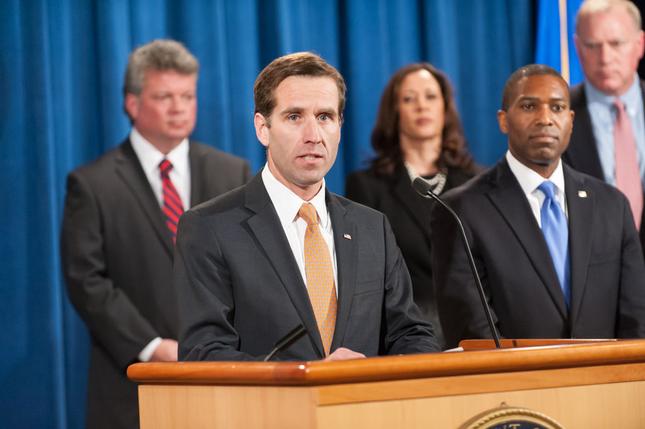Beau Biden: ‘the Finest Man Any of Us Have Ever Known’
By • June 12, 2015 0 1383

The story came over the news world online as a New York Times piece, straightforward as a hurtful arrow: “Beau Biden, Vice President Joe Biden’s Son, Dies at 46,” read the headline.
Everything after that—the sparse details of his death of brain cancer at Walter Reed Hospital, his seeming escape from the same fate with an earlier bout of cancer, his career as attorney general of Delaware, the possibility that he might have run for governor—instead of the Senate—his military service as a member of the Judge Advocate General’s Corps in the Delaware National Guard who was deployed in Iraq in 2008 where he was a recipient of the Bronze Star—all that were biography heavy with undertone.
The deeper, larger story was about family and how and why family matters so much in the lives of the people we chose to be our leaders, and how, when tragedy strikes those same people, it seems more than usual, also to strike us, as a kind of informing warning, as a piece of knowledge that hurts us, too.
He was officially and by birth certificate Joseph R. Biden III, which made his father the vice president, a Jr., but taken together the two men were two sides of a life’s coin—the face of each predicated the other at times, as if Beau had anticipated his father’s older face with the same broad smile, not in mimicry, but in sunny, buoyant exactitude.
This death, one assumes was horribly hurtful to Biden, to the family—deep feelings, in plain written words could be felt in the vice president’s public statement: “It is with broken hearts that Hallie, Hunter, Ashley , Jill and I announce the passing of our husband, brother and son, Beau, after he battled brain cancer with the same integrity, courage and strength he demonstrated every day of his life.”
In the words of the Biden family: “Beau Biden was, quite simply, the finest man any of us have ever known.”
There was a kind of sad echo in the statement, the memory of a previous major tragic loss for Biden and the family—it was the absence of other names—Biden’s first wife Neilia and their 13-month-old daughter Naomi, who were killed in a car accident on December 18, 1972, only a few weeks after Biden had won an improbable come-from-behind Senate race. His sons Beau and Hunter were hurt in the crash. Biden took his oath of office in the hospital where his boys were being cared for. Senator Joe Biden was 30 years old then. Famously, the new senator commuted by train, going home from Washington to his family every night. He had said it was not that he could be there for them, but primarily, so they could be there for him.
Beau was remarkably like his father, giving his dad’s nomination speech at the 2008 Democratic Convention. He told the gathered political family of his father: “I have something to ask of you. Be there for my dad like he was for me.” Beau was soon to leave for Iraq.
They were bound, it seems now, by strong love, no doubt humor, idealism and deep respect.
Bonds of family are like ropes that can be frayed with losses, but ultimately, for some, they are difficult to break, the true bonds that bind.
President Barack Obama said, “For all that Beau Biden achieved in his life, nothing made him prouder, nothing made him happier, nothing claimed a fuller focus of his love and devotion than his family. Just like his dad.”
The best political leaders—the best presidents—we have had had an acute sense of tragedy, from experience and through empathy. That was true for Washington, Lincoln, all the Kennedys, the Roosevelts and, sadly, again, now for the vice president.
Joseph R. Biden III, Beau, is survived by his wife Hallie, and their two children, Natalie, 11 and Hunter, 9; his parents, the vice president and Jill Biden, his brother Hunter and his sister, Ashley Biden.

